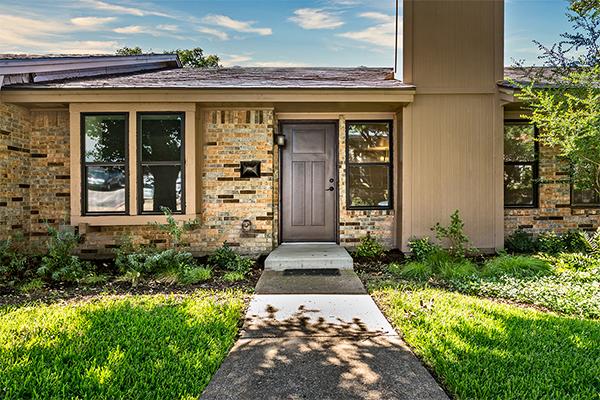With inflation continuing to impact the cost of everything from gas to groceries and the record increases in rent over the past few across the country, finding the extra cash to save for a down payment on a home can feel impossible — especially if it’s your very first home. In a recent Bankrate survey, close to three-fourths of would-be homeowners said affordability issues block them from buying.
First-time homebuyer grants, available through banks and state and local governments, can help you bridge the savings gap.
What is a first-time homebuyer grant?
You’ll find many options for financial help as a first-time homebuyer, but there’s one key piece that separates grants from other forms of help: You don’t ever have to pay the money back. The funds from a grant can help you cover a down payment on a home and the closing costs you’ll need to hand over before you move in. Some grant programs are available to those who have purchased a home before, too.
What’s the rationale behind these grants? The thinking is that homeownership is a boon not just for individuals but for communities and society at large by building stability and generational wealth. It may also increase local spending, which benefits small businesses in the area. Homeowners pay property taxes, which enhance state and municipal budgets — and the amount municipalities can then spend on infrastructure and amenities. Long story short: It benefits local and state economies to encourage homeownership.
Because they’re essentially free money, first-time homebuyer grants differ from other down payment assistance programs, which can help you afford a home in the present but come with some strings attached for the future.
How to qualify for a first-time homebuyer grant
Not all first-time homebuyers are eligible for first-time homebuyer grants. These programs tend to be geared toward those who can be classified as a low- or moderate-income borrower, and that definition depends on your income and where you want to live. While eligibility requirements vary, here are a few elements common to most grant programs:
- Income limits: Many programs designate households that earn 80 percent or less of the area median income (AMI) as “low-income,” and limit the program to those in that range. The income limits also vary based on how many people are in the household.
- Home price limits: Your spending also might be restricted within a certain range of residence. Again, these limits vary widely based on the local housing market.
- Your contribution: While you’ll get assistance for the bulk of the purchase, many grants stipulate that the homebuyer needs to chip in some cash. One common ask is either 1 percent of the purchase price or $1,000 (whichever is greater).
- Your residence status: You typically can only get a grant to help buy a home you’ll actually make your primary residence, not one you’ll rent out to someone else or use as a second home.
- Additional education: Many grant programs require you to complete a homebuyer education course prior to receiving the funds.
Types of first-time homebuyer grants
Some are public, others are sponsored by private enterprises.
1. HomePath Ready Buyer program
The HomePath Ready Buyer program is offered by Fannie Mae, one of two government-sponsored enterprises that back mortgages and buy them from lenders. With this program, you can get up to 3 percent of your home’s purchase price to help with closing costs. However, you’re limited in what you can buy — it has to be a HomePath property, a foreclosed home owned by Fannie Mae. You’ll also need to complete a homebuyer education course.
2. National Homebuyers Fund
The nonprofit National Homebuyers Fund sponsors down payment and closing cost grants that can total up to 5 percent of your home’s purchase price. You actually don’t have to be a first-time homebuyer to qualify, but you do need to find a mortgage lender that participates in the program. You can call the organization for assistance finding lenders in your area at 866-643-4968.
3. Bank of America grant programs
Bank of America offers two grant options to help with a down payment and closing costs: the America’s Home Grant and Down Payment Grant programs. America’s Home Grant provides up to $7,500 in lender credits for closing costs, while the Down Payment Grant provides up to $10,000 in down payment help. You’ll have to get your mortgage from Bank of America, however, and for the Down Payment Grant, there could be tax implications.
4. Chase Homebuyer Grant
The Chase Homebuyer Grant is available for primary residence purchase in select areas of the country that meet specific census tract requirements. The program provides grants of $2,500 or $5,000 that can primarily be used to help buy down the applicant’s interest rate. But the money can also be used for fees associated with the mortgage or down payment costs. The Homebuyer Grant is available to applicants who are seeking DreaMaker, Standard Agency, FHA and VA mortgages.
5. Good Neighbor Next Door program
While the Good Neighbor Next Door program technically falls under the “forgivable loan” category, the potential free money is so notable we’ve included it here. Available to law enforcement officers, teachers, firefighters and emergency medical technicians, this program from the U.S. Department of Housing and Urban Development offers a 50 percent discount on homes in designated revitalization areas. As long as you live there for three years, you get the property for half off the list price with no need to pay that discount back. As with the HomePath program, you won’t have the freedom to buy just any home, however.
6. State and local first-time homebuyer grants
In addition to nationally available grant programs, you might be able to find financial assistance from an organization closer to home (or where you want your home to be). Many states offer grant programs for budding homebuyers, especially if they’re relocating for work. Check with your state’s housing finance authority. You may also want to ask your real estate agent for advice about grants in your area.
Local mortgage lenders may also be able to point you toward free money. For example, First Federal Bank of Kansas City offers eligible buyers a grant of up to $5,000. llinois-based Wintrust Bank has a homebuyer grant program that helps first-time and repeat borrowers get up to $10,000 for a down payment. New York-based ESL Credit Union has a matching program for Black and Latinx first-time homebuyers that can provide up to $10,500 of grant money.
How to apply for a first-time homebuyer grant
Most grant programs come with minimum credit score requirements. Before you apply, review your credit report and check your credit score. The application process for these programs also typically requires extensive documentation of any sources of income.
For W-2 applicants, the income documentation generally includes providing at least two months of pay stubs and verification of employment. Applicants who are self-employed may be required to provide the past few years of tax returns in lieu of pay stubs, as well as a profit and loss statement for the business and bank statements.
In addition, if your income includes child support or spousal support, you will likely be required to provide documentation of this as well, including proof of payments. Individuals who receive Social Security of VA benefits must provide proof of this income as well.
Once you’re ready, and have gathered all documents, complete your application online. You might be able to apply for multiple grants, too, so don’t be shy about trying to score more financial assistance.
Other financial help for first-time homebuyers
If you can’t find grants in your area that work for you, you aren’t out of luck just yet. There are other low-cost first-time homebuyer loans and programs to get help with a down payment. You may also qualify for a forgivable loan, which could end up functioning much like a grant (if you meet certain requirements, you never have to repay the loan). Here are a few options to explore:
- DPA second mortgages – A DPA second mortgage (the DPA stands for “down payment assistance”) is available through many states’ housing finance agencies. In a DPA second mortgage program, you’ll apply for a 30-year mortgage to finance the home, and then another mortgage for a smaller amount to help with the down payment or closing costs. Just like the first mortgage, this second loan comes with an interest rate (although it might be lower than the first), and you’ll pay it back over a period of time.
- Deferred-payment loans – Instead of requiring you to immediately start paying back the down payment assistance funds, some programs allow you to defer these payments until you sell your home, refinance or pay off your mortgage. The assistance won’t accrue interest in the meantime, so the amount you owe won’t grow.
- Forgivable loans – Forgivable loans are the closest cousin to grants because they can wind up being free — but only if you live in the home long enough. For example, you might be able to borrow $5,000 to help with a down payment, with the loan balance reduced every month over 10 years. If you move before that time frame’s up, you’ll need to pay back a portion of the loan. If you stay in the home for 10 years, though, it’ll be completely forgiven.
- Individual Development Accounts (IDAs) – IDAs are matched savings accounts designed for those with certain work and income parameters, typically those with a low income. IDAs are offered through some public housing organizations and private nonprofits and usually provide a dollar-for-dollar match, up to a specific amount, for savings goals, including a down payment and closing costs.
Next steps for first-time homebuyers
Becoming a homeowner for the first time can seem daunting, especially when inflation continues to impact the cost of living and make it more difficult to save money for various homebuying expenses. The good news is that there are grant programs available across the country that are designed to make homeownership more accessible for new buyers.
If you’re hoping to put renting behind you, begin by researching the grant programs you may be eligible for and gather the documents needed to apply. Even if you can’t find a grant program in your area, don’t despair. There are also many first-time homebuyer programs that can make homeownership far more attainable.





